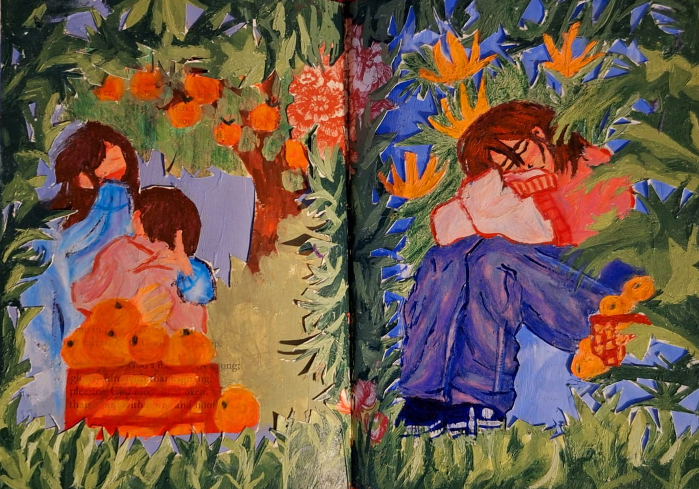
Richard’s mouth was still wired shut back then. He’d gotten it done the summer before and some abnormality in his jaw had prolonged its use long past the expected removal date. It was a sensitive subject for him—mentions of things even so vague as surgeries or metal were strictly off-limits. He had to drink all his food through some tube contraption that went up his nose, and he couldn’t talk at all. The surgeon he’d seen had botched his mouth up something awful. Even years later, he was never quite as outgoing as he’d been before.
You have to understand; being thirteen and different is an impossible combination to manage. Already at that age, everybody feels incurably othered from the people around them. Maybe their hair won’t lay quite right, or they don’t catch on to jokes quickly enough, or the clothes they wear are a few years out of fashion. Most often the subject of these worries is unoticable to their peers, and this knowledge provides them with at least a glimpse of comfort. But Rich didn’t even have that. It was horribly obvious, the thing that made him different. And everyone—from the hairy old gas station attendant to the little girl who lived down the block—knew it.
Richard and I were inseparable that year. I usually knew what he wanted to say before he tried to say it; other people, even his parents, relied on me to understand him and subsequently translate. I don’t quite know why nobody else could. His is still the most expressive face I’ve ever seen, even fifty-odd years later. His emotions and wants and needs were always written all over his face. I always thought I could see a drowning kind of relief in it whenever I guessed what he wanted to say on the first try.
Of course, Rich had a little blackboard he carried in case I wasn’t around. The doctors had told his folks that there were other options, like a large booklet of common words that he could point to if he needed. But they didn’t want to blow the money on it, so there he was, stuck with his raggedy scrap of chalk. He hated having to write everything down so I tried to stay as nearby as possible, as often as possible.
I think that’s a lot of the reason we were so close that year. I spent every weekend with him, building rock dams in the little creek that ran behind the bar, or biking around the scrappy underbrush that edged the forest, or sometimes just doing homework at my house, never his. Rich didn’t like being home if he could help it. Even if I asked, he didn’t ever give me a real reason, just bullcrap excuses like The old man’s having people from the shop over or Ma wanted me to help plant onions so I ditched or, if he was feeling particularly uncreative, Carly’s being a bitch again.
Carly was his older sister—she made seventeen that year, and according to Richard, was the worst person in the world. Their folks owned the only autoshop in town and she helped out after school most days. She was the golden child. Rich resented that. He resented most things, he told me. Once I asked if he resented me too, and he’d looked at me like I was crazy. He’d scoffed. Don’t be an idiot, the scoff had said. Use that goddamn brain of yours.
I remember losing most of my other friends when I started hanging around Rich all the time. I remember not caring much. They’d yank on his clothes in the hallways and clench their teeth at him in an ugly attempt to imitate his wired jaw, and, later, they’d make up nasty jokes about what the two of us did in our spare time. The rumors ranged from killing cats to shooting up to vandalism, and not a one of them had a single lick of truth to it. Richard used to apologize to me all the time for that stuff, as if it was his fault. He thought I was some kind of hero for rubbing shoulders with someone like him. In reality, I just liked him. A lot. He was clever and funny and when he and I made up our own system of hand signs instead of bothering with ASL, our conversations became all the more interesting.
I guess what I’m getting at is that Rich was a good guy. Better than me, that’s for sure. I followed him around like a stray dog begging for a meal, a glance, anything at all. It must have appeared to anyone on the outside that I led the way in our various childish endeavors; obviously, I was the one who did the talking. But he was the visionary pulling the strings. When we finally scraped up enough money to see a movie in the dingy old theater on Hargrove, it was his idea to sneak into The Godfather instead of watching The Lorax, which we’d bought tickets for. We sat in the very back, in front of the projector, and Rich’s eyes stayed alight the entire time.
The final I ever saw him was at the end of senior year, walking across the stage with his hair flopping over his eyes. He’d long since gotten rid of the wires. By that point, we hadn’t spoken in years—I think the last he’d heard from me was the letter I’d sent when Carly overdosed at college across the country. The principal handed him his diploma and he walked off the stage, and when it was my turn I did the same, and I looked at him and he looked back and he gave me that old hand sign that translated to something between good luck and goodbye.